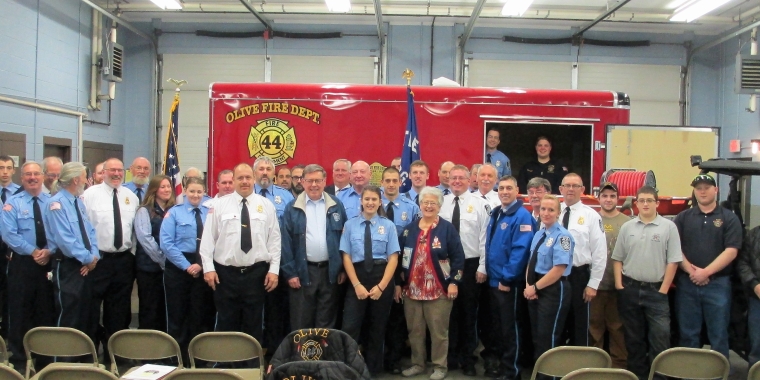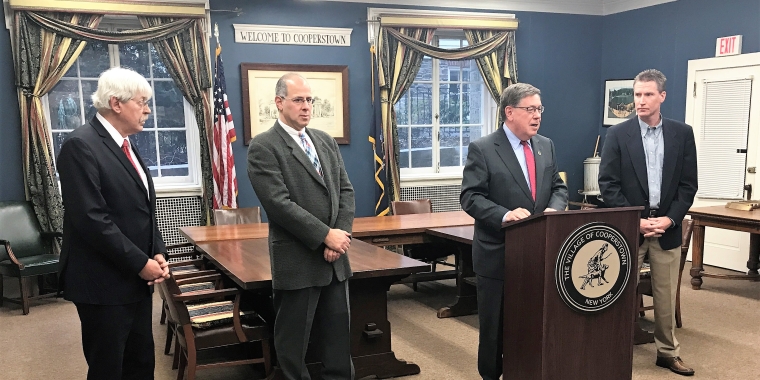
Budget Clock Keeps Ticking
James L. Seward
June 3, 2010
-
ISSUE:
- Budget
A couple of weeks ago, through this column, I voiced my concerns with the ongoing state budget stalemate. It is now June, and the budget is more than two months overdue, yet the political leaders in Albany still seem to lack a real sense of urgency.
Instead of moving forward and negotiating a complete budget with public, bi-partisan conference committees, as required by law, New York continues to operate on weekly emergency extenders. The bare-bones spending bills include just enough funding to pay the state bills – although not all responsibilities are being met.
As I have stated in the past, the construction industry is one of the chief victims of the budget impasse. The governor’s budget bills continue to withhold payments for already approved projects – basically a breach of contract. Every day that goes by without a state budget is another day cut from the already short construction season. It also means another day of unemployment for thousands of workers who have been laid off in recent weeks. Families are hurting, public costs are rising and vital infrastructure projects are left in a state of disarray, all thanks to the budget impasse.
Another budget related item that recently received a great deal of media attention was the potential closing of several state parks and historic sites. An eleventh hour deal, slapped together just prior to the Memorial Day weekend, staved off the closures, but at what cost?
The parks plan that was negotiated in secret by Democrat leaders includes millions of dollars in new taxes and fees on businesses and reduces environmental protection funds. The architects of the bill don’t care about hiking trails; they are instead using the parks as political pawns to continue with their favorite pastime - hiking taxes.
The Business Council of New York State opposed the legislation because it increases fees “by more than 20 percent overall, and subjects a number of businesses – mostly upstate manufacturers – to significant increases.”
The National Federation of Independent Businesses said, “This proposal is a tax and fee increase, which will further weaken our economy and negatively impact New York’s already imperiled manufacturing sector. This proposal is even more troubling because a retroactive, mid-year tax increase such as this would pose an especially onerous burden for New York employers.”
Calling the deal a colossal blunder, EPL/Environmental Advocates and the New York League of Conservation Voters also attacked the late-night deal as procedurally flawed and wholly inadequate.
Days before the last minute Hail Mary bill was adopted, I had joined with senate Republicans in proposing a simple solution that would have kept the parks open without resorting to tax and fee hikes. In the budget extender bill approved that week, the governor proposed sweeping $65 million from the New York Power Authority. I supported an amendment to the budget extender that would have used $6 million from that action to fund parks. The plan was rejected by senate Democrats.
The parks issue is a microcosm of the entire state budget process that has left New Yorkers frustrated and angry. Even more frightening is the prospect that the Democrats’ answer for the parks issue signals what is to come when, or if, a budget agreement is reached – and that is secret negotiations and more tax and fee hikes. That is not going to be a vacation for anyone.
The senate Democrats made a promise that they wouldn’t raise taxes this year. They didn’t take long to break that promise, just like last year when they raised taxes by $8.5 billion and passed a $1.5 billion payroll tax. Already they have joined with pro-tax hike special interest groups calling for more taxes on tourism, health care, beverages, vending machines, financial services and even shopping bags.
This strategy will only further damage our upstate economy and must be blocked. We can start by convening public conference committees, where we can bring these issues to light, rather than have them sorted out in a backroom deal that leaves taxpayers holding the bag.
Share this Article or Press Release
Newsroom
Go to NewsroomSeward Kicks the Tires on Olive FD UTV
December 5, 2017

Seward Secures $250k for Cooperstown WiFi Project
December 5, 2017

Seward Secures Funding for Cortland Child Care Center
December 1, 2017

